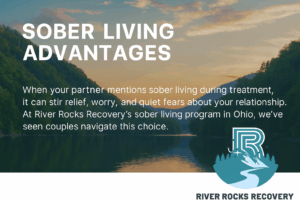When your partner tells you they’re considering sober living during treatment, it can stir up a mix of emotions. Relief that they’re taking recovery seriously. Worry about how you’ll manage the distance. Maybe even a quiet fear of what it means for your relationship.
For couples who’ve been through the strain of addiction, the idea of living apart—especially right after treatment—can feel like yet another test. But sometimes, it’s exactly what both partners need.
At River Rocks Recovery’s sober living program in Ohio, we’ve seen couples navigate this exact moment. Supporting their choice doesn’t just help them—it can also give you the space and clarity you need. Here’s why it matters and how to take care of yourself in the process.
Sober Living Extends the Safety Net
Treatment is an intense, structured environment where most decisions are guided and many triggers are removed. The leap from that level of support back into everyday life can be jarring.
Sober living acts as a bridge, keeping a layer of accountability and stability in place while your partner learns to apply recovery skills in real-world settings.
Think of it like trading a life vest for a sturdy boat—still safe, but with more room to move. They’re still surrounded by peers in recovery, daily routines, and house rules that reduce risk, but they’re also making more of their own choices.
Why Distance Can Be Helpful, Not Harmful
When you’ve been through active addiction together, your relationship may have been shaped by crisis—checking in constantly, managing fallout, walking on eggshells. That’s not an easy cycle to break, even when they get sober.
Physical space can give emotional breathing room. It allows your partner to focus entirely on recovery without feeling like they’re being monitored, and it allows you to rediscover what stability looks like without carrying the weight of their day-to-day decisions.
Being apart for a while doesn’t mean you’re drifting apart—it means you’re building new patterns on both sides, which can actually make your connection stronger.

Supporting Their Choice Without Losing Yourself
Supporting their move into sober living is not about putting your own needs on hold. It’s about showing belief in their ability to take ownership of recovery, while also tending to your own well-being.
Some practical ways to do that:
- Agree on communication boundaries. Decide how often you’ll talk, and stick to it. This helps them focus on the program while also giving you predictable connection.
- Respect their schedule. Many sober living programs have curfews, group meetings, and chore assignments. Interrupting those to talk may feel supportive to you, but can be disruptive to them.
- Seek your own support. Consider groups like Al-Anon, Nar-Anon, or therapy with a counselor who understands addiction’s impact on relationships.
Supporting them is easier when you’re not running on empty yourself.
How Sober Living Can Strengthen Your Relationship
Recovery is about more than staying sober—it’s about creating a life that supports that sobriety. When someone finishes treatment and goes straight home, they’re immediately juggling recovery with work, bills, and relationship dynamics.
Sober living slows that transition. Your partner can focus on maintaining their sobriety, building new routines, and deepening their coping skills before stepping back into full responsibility for everything at once.
This doesn’t just help them—it helps you, too. You get to reconnect with a version of them that is more grounded, self-sufficient, and emotionally present. That’s a better foundation for a long-term relationship.
Coping Strategies While They’re Away
Even if you believe in the benefits of sober living, the separation can be challenging. Here are a few strategies that can help you cope:
- Keep your own structure. Maintain routines that support your emotional and physical health.
- Stay socially connected. Spend time with friends or family who make you feel supported and understood.
- Focus on personal goals. Use this time to take a class, start a hobby, or work toward something you’ve been putting off.
- Practice mindfulness. Stress and worry can spiral quickly. Simple practices like deep breathing, journaling, or guided meditation can help you stay grounded.
Remember—your life is still your own, even while your partner is in sober living.
Talking About Your Concerns
It’s natural to have questions, doubts, or fears. The way you communicate them can make a difference in whether your partner feels supported or judged.
- Use “I” statements. This keeps the focus on your feelings, not accusations. (“I feel anxious about us being apart” vs. “You’re abandoning me.”)
- Ask for information. Understanding the program’s rules, expectations, and supports can ease uncertainty.
- Invite collaboration. If there are concerns about finances, schedules, or visits, discuss them as a team.
Many sober living programs—including ours—encourage healthy partner involvement at certain stages, such as attending family sessions or check-ins.
The Emotional Ups and Downs Are Normal
Supporting someone in recovery isn’t a steady climb—it’s more like a series of waves. Some days, you’ll feel encouraged and hopeful. Other days, doubt and fear may creep in. That doesn’t mean you’re doing it wrong; it means you’re human.
Allow yourself to feel those emotions without guilt. The same patience and grace you’re extending to your partner is something you deserve as well.
FAQs About Sober Living and Partner Support
Is sober living the same as treatment?
No. Sober living is housing with structure, accountability, and peer support. It’s often paired with outpatient therapy, but it’s not a clinical treatment program on its own.
Will living apart hurt our relationship?
Not if both partners use the time intentionally. Many couples find that it actually strengthens their relationship because both people are able to focus on personal growth.
How long will my partner be in sober living?
It varies. Some stay for 3–6 months; others stay for a year or more. The decision depends on their recovery needs and progress.
Can I visit or call them while they’re there?
Most programs allow contact, but there may be limits—especially in the first few weeks. This helps residents focus on adjusting to the program.
What if I’m afraid they’ll relapse after sober living?
Relapse is a risk in any stage of recovery, but sober living reduces that risk by extending the support system beyond treatment. Encouraging them to continue with aftercare and community support is key.
If your partner has mentioned sober living during treatment, it’s not a sign they’re leaving you behind—it’s a step toward making recovery last. By supporting their decision and caring for yourself, you’re both laying a stronger foundation for the future.
Call (888) 905-6281 to learn more about our sober living services in Middletown, Ohio.

